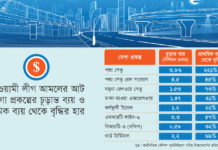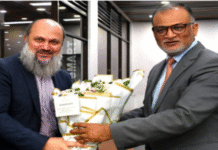16 DAYS OF ACTIVISM AGAINST GENDER-BASED VIOLENCE

Historically, around the world women’s decision-making capacity regarding reproductive health choices had been limited by their husbands and society. Bangladesh has been a leader in family planning programming transforming women’s access to essential services. Currently, over 52 percent of women have access to and use a modern contraceptive. However, more is needed to ensure all have access to these options.
There are currently 7.4 million women in Bangladesh who would like to use a family planning (FP) method, yet do not have access to them. Despite services being available, many women are unable to exercise their right to access them. The Violence Against Women (VAW) Survey 2015 conducted by Bangladesh Bureau of Statistics indicated that women do not enjoy equal participation as men in household decisions. Furthermore, inequality in household decision-making and finances affects women’s ability to independently access family planning.
But even with access, women often face challenges in negotiating with their spouses regarding their FP method choices. Almost two-thirds (72.6 percent) of ever-married women experienced one or more forms of violence by their husbands at least once in their lifetime (VAW 2015, BBS).
Shahina, a family welfare visitor from Sitakunda, Chattogram, has often addressed gender-based violence while providing family planning services. She remembers an incident when a husband brought his wife to the facility, who experienced a method failure and became pregnant. The husband openly scolded his wife for becoming pregnant in front of everyone and was about to beat her when Shahina had to intervene to stop him. Shahina was able to provide counselling to that couple which led to better understanding between them, and the husband supported his wife’s maternal health care afterwards.
There is a correlation between women who experience gender-based violence and a decreased ability to negotiate using family planning methods, making them more vulnerable to unintended pregnancies. Furthermore, as mobility is restricted during this Covid-19 pandemic, there has been a spike in gender-based violence in Bangladesh requiring recognition of the impact that gender has on access to family planning and other health services. Greater collaboration among all social services is needed to address and eliminate violence.
As we observe the 16 Days of Activism against Gender-based Violence, we call upon all, including men and boys, to actively contribute to gender equality and to help eliminate gender-based violence. We applaud the government of Bangladesh’s commitment to zero tolerance for gender-based violence. The United States Agency for International Development through its USAID Accelerating Universal Access to Family Planning Project, also known as Shukhi Jibon, is supporting the government of Bangladesh to address gender integration in reproductive health services to reduce the unmet need for contraception as well as to contribute to the elimination of gender-based violence.
We all can contribute to eliminating such violence, especially during the ongoing Covid-19 pandemic, by supporting women and girls in the decisions they make and help them to stay safe and free of violence.
Caroline Crosbie is Senior Country Director, Pathfinder International, Bangladesh and Project Director, USAID Shukhi Jibon Project. Shamima Parveen is Gender Manager, USAID Shukhi Jibon Project, Pathfinder International, Bangladesh.









